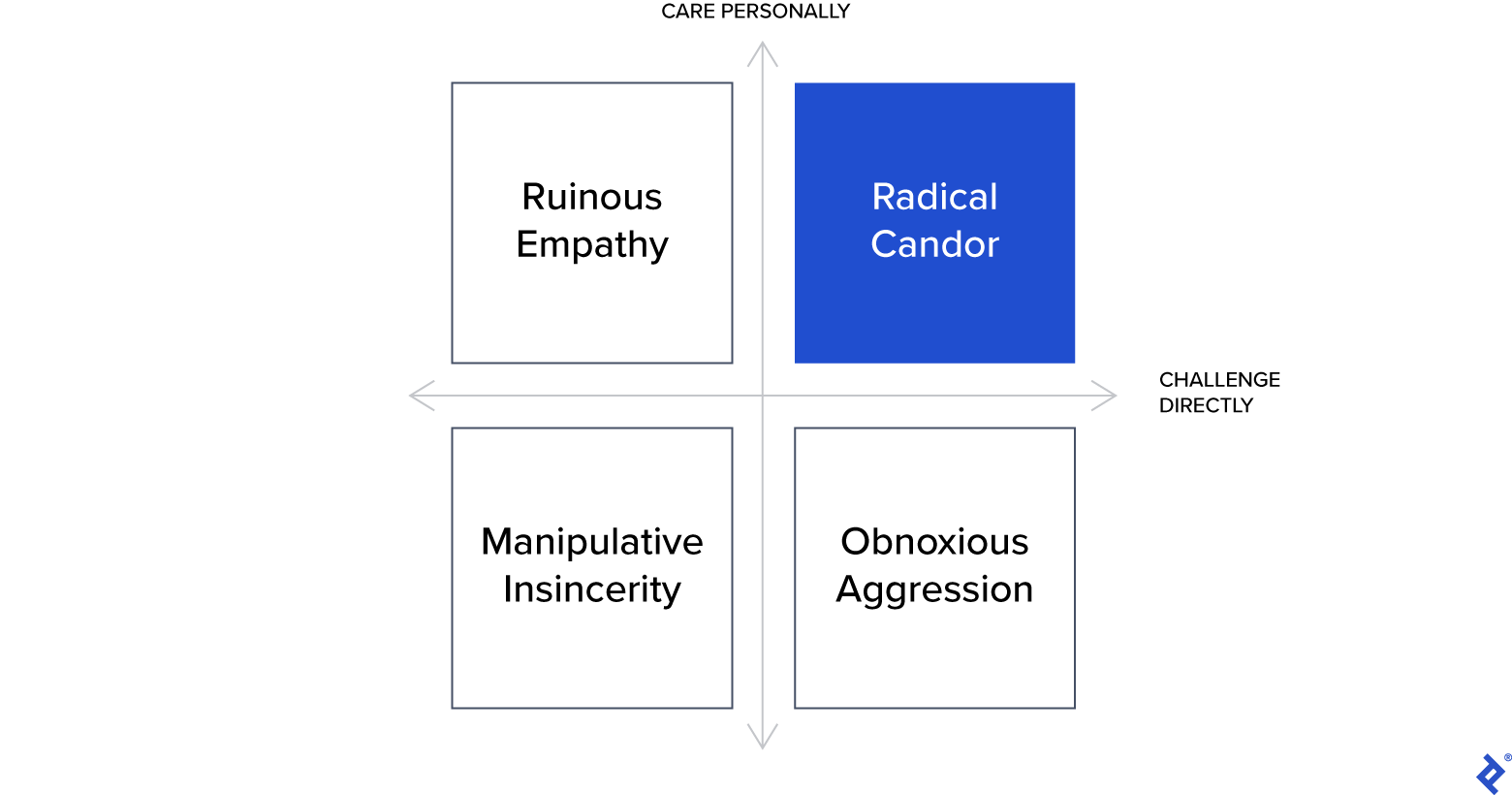Using the Radical Candor Framework for Effective Engineering Management
One tool that managers can consider adding to their management skill set is a practice called Radical Candor. Radical Candor is the ability to care emotionally about the engineer as an individual and valued contributor, while also expressing honesty concerning their efforts and results achieved by those efforts.
One tool that managers can consider adding to their management skill set is a practice called Radical Candor. Radical Candor is the ability to care emotionally about the engineer as an individual and valued contributor, while also expressing honesty concerning their efforts and results achieved by those efforts.

Peter Varhol
Peter is a technologist and editor on staff at Toptal, and speaks on software development, testing, and DevOps at technical conferences worldwide.
Expertise
Managing engineers seems like it should be one of the easiest and most straightforward activities in the realm of managing professionals. Engineers tend to be logical and intelligent and should be responsive to both well-thought-out instructions and feedback on performance and results.
But in the real world, managing engineers is a complex process. While engineers are often highly logical and rational in their dealings with their work and colleagues, some lack empathy and social skills. This can result in responses to feedback that might be seen as obstructive or uncooperative, as the engineers are unable to integrate feedback in a neutral and emotion-free way.
Without the necessary skills and experience in reading others and interpreting their actions and reactions, engineers may come off as excessively emotional and even petulant when carrying out their assigned tasks.
One tool that managers can use to address such behavior is a practice called Radical Candor. Radical Candor is the ability for the manager to use a strong personal relationship with the employee to provide honest direction and feedback on assignments and job performance.
Radical Candor follows a specific set of definitions and actions on the part of the manager and, along with other management techniques, can turn managing engineers into a consistent practice with high-quality results. Here is what Radical Candor looks like.
The Radical Candor Matrix
Radical Candor is best described by examining what happens when a manager and subordinate interact, both on a daily basis and in response to specific assignments. The interaction is defined by a specific set of approaches taken by the manager to establish both a personal and professional relationship with the engineer.
Radical Candor can be pictured as quadrants in a matrix. Radical Candor itself represents the ideal: caring about the subordinate as an individual as well as the ability to express constructive criticism and direction objectively, without passing judgment on the individual.

The x-axis of the matrix measures strength of professional interaction between the manager and subordinate, from silence to direct challenge. Silence refers to not showing any level of professional interaction to a subordinate, while direct challenge demonstrates unfettered and often intense interaction. The y-axis of the matrix measures empathy and emotion, from caring personally about the subordinate to a distinct lack of concern for their emotional well-being.
A manager practices Radical Candor through a strong personal relationship with the engineer that enables him or her to be honest - that is, to practice candor in feedback and direction. The feedback, even negative feedback (as long as it is constructive), is accepted and acted upon by the subordinate because the strong relationship already exists between the two individuals.
Getting There Can Be Tricky
Two intermediate categories are ruinous empathy and manipulative insincerity. Ruinous empathy is having that personal relationship and caring for the subordinate but with a reluctance to confront and provide objective feedback. This can cause the subordinate to not receive the feedback needed to understand their goals and take corrective action if necessary.
Manipulative insincerity is the opposite approach. It provides relatively honest feedback but does so without first establishing a strong personal relationship with the subordinate. This is harmful in that while the feedback is likely to be insincere or passive-aggressive, the subordinate doesn’t trust it because it is delivered without first establishing the human relationship.
There is also an approach without empathy and honesty. This is termed obnoxious aggression, and its definition and implication are obvious. A manager who is obnoxious and aggressive toward a subordinate lacks both a personal relationship and the ability to effectively direct an employee.
It’s possible to use this matrix to model how a manager interacts with an engineering subordinate. The range of interactions goes from almost none at all to fully engaged and respectful. A manager who has established Radical Candor with a subordinate is fully engaged in both the personal well-being and professional success of that person.
Steps to Radical Candor
To establish Radical Candor, a manager has to be able to create the right environment and follow through with defined actions. Here are the steps needed in order to build a successful Radical Candor program:
- The manager has to be able to first establish a personal relationship. Having a personal relationship doesn’t necessarily mean establishing a friendship. In fact, having a genuine friendship might actually cause the Candor matrix to fall into the ruinous empathy quadrant, where the manager prioritizes caring and empathy over accomplishing an activity and providing feedback to the team member. Instead, the manager has to work to establish an “emotional safe space” where the subordinate can feel safe and confident in interacting with authority and following directions. While that space must center around work, it can also extend to interpersonal relations with others.
- Only after that safe space exists can the manager take the next step into honest and objective feedback. The manager does this carefully, often engaging the subordinate in self-reflection in order to guide them in the desired direction.
- Once the subordinate becomes used to thinking about and responding appropriately to feedback, it becomes possible for the manager to express constructive criticism without concern for misunderstanding or hurt feelings.
The Origins of Radical Candor
Radical Candor was developed by Kim Scott, a highly successful manager at Google who later worked at Apple, where she developed and taught a class on optimal management. In her consulting work, she has identified three simple principles for building better relationships with your employees: Make it personal, get stuff done, and understand why it matters.
What is behind those principles? First, making it personal means to establish a real and personal connection between two individuals. While the fact that they have a structured working relationship means that in some ways that connection is artificial, it can still result in genuine feelings of affection and respect. Some managers and employees believe that it isn’t appropriate to be personal with one another, but that’s not the right conclusion. Instead, respect and honesty can form the basis of a solid working relationship.
The second principle, get stuff done, refers to using that respect and friendship relationship as a basis for trusting each other to do a particular job. Once the manager and subordinate have established a strong personal relationship, it can form the basis of an honest professional one. If there is trust on a personal level between manager and subordinate, then that trust will carry over into the professional relationship, making it easier and more reliable to get work accomplished.
The third principle, understanding why it matters, consists of two components. Smart and capable people need motivation that comes from believing that their work is important and relevant in the grand scheme of things. This helps them in doing a good job and caring about the results.
Doing work that matters also enables team members to believe that their work contributes to larger team and organizational goals. This provides a sense of fulfillment from the standpoint of both individual accomplishment and team participation.
Not a Cure-all for Poor Management Practices
Practicing Radical Candor by itself won’t establish a good working relationship with engineering subordinates. However, it can improve relationships between managers and individual contributors. At worst, it can lay the groundwork for a higher level of respect between manager and subordinate, and also between coworkers in general.
At best, Radical Candor can have uncounted benefits to the manager, the subordinate, and the team in general. First, it can improve the quality of work by the individual engineers. Second, it can enable the team to work better together, as individual team members are able to accept feedback from one another.
Yet, Radical Candor isn’t easy to achieve from an emotional standpoint. From the manager, it requires a grounding in steady and level-headed interactions with every subordinate, as well as with other stakeholders in the activity. At the same time, the manager has to clearly communicate those attributes to the engineering subordinate and ultimately live by those attributes altogether.
Individual engineering contributors have to examine their own work and personalities objectively and be committed to working both with teammates and manager to achieve the needed levels of objectivity. And from the manager’s standpoint, Radical Candor can only be a part of the management solution. While the emotions and actions employed aren’t fake, by themselves, they won’t work in an organizational vacuum.
Further Reading on the Toptal Blog:
Understanding the basics
How do you use Radical Candor?
Radical Candor is a management technique whereby managers establish a strong empathetic relationship with team members and use that relationship as a basis for providing honest and constructive feedback, even when negative feedback is warranted.
Is Candor a good thing?
Candor with objectivity is almost always a good thing, Because Candor is a powerful tool, a manager has to set the right expectations before successfully using it. Establishing an empathetic relationship with subordinates first is a proven precursor of using Candor successfully.
What does Radical Candor mean?
Radical Candor is about providing guidance to employees as a mix of praise and constructive criticism, delivered to produce better results and help employees develop their skills and successes.
What is ruinous empathy?
Radical Candor consists of a matrix with two axes: empathy and criticism. If a manager is empathetic with a subordinate but doesn’t use that as a basis for candor, it is likely to cause that subordinate to fail at some point.
What is obnoxious aggression?
If a manager uses criticism without first establishing empathy, that criticism is often viewed as aggression, because it criticizes without having a good relationship with the subordinate. The subordinate will likely view such criticism as harsh or unwarranted, and not accept its validity.
